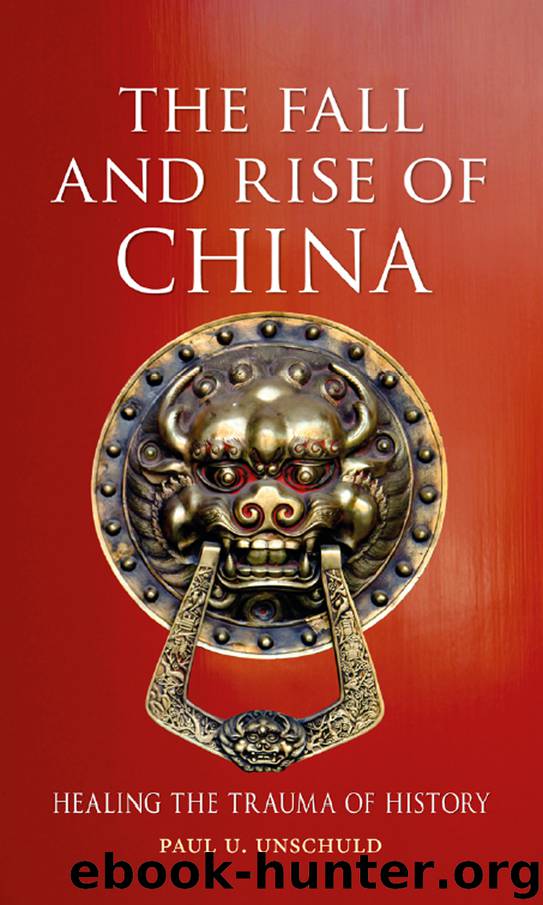The Fall and Rise of China by Paul U. Unschuld

Author:Paul U. Unschuld
Language: eng
Format: epub
Publisher: Reaktion Books
SEVENTEEN
Europe and the Discovery of Social Welfare
UNTIL THE LATE eighteenth century the development of Europe in some ways resembled that of China. The secular, non-religious, analytical explanation of the world gradually evolved into natural science. Christian theologians always watched this tendency with suspicion and occasionally even considered the murder of this or that scientist to be justified if it helped preserve the influence of theology. Yet over the centuries European science accumulated more and more insights that helped liberate people from what theologians saw as the unknowable will of God or, in the scientists’ view, the rigours of nature. The growing appreciation of the laws of nature served to unshackle people from all the restrictions that nature had imposed upon them.
The aeroplane overcame humans’ inability to fly. Highly complex prosthetic devices eased the disabilities of amputees. To relax the strictures facing the human mind, computers were introduced to work alongside it as electronic brains. Theologians protested vigorously whenever another threshold seemed to have been crossed on the way towards perfecting the human organism, freeing it from pain and fulfilling most people’s wishes for lasting good health. Yet Europe’s analytical science also set in motion a process of existential self-determination that remained closed to China’s relationist science.
As European science conveyed the message that behaving according to the dictates of the laws of nature helps people to avoid sickness, it also placed responsibility for illness itself on the individual. In the course of almost two millennia, this individualized responsibility obviated the need for any healthcare policy worthy of the name today. Minimal steps were enacted here and there to remedy the most deplorable conditions, but there was no conceptual basis for the comprehensive, caring intervention of a government authority.
That changed in Europe – indeed, only in Europe – during the later eighteenth century. The transformation was admirably captured in two influential books that were published in quick succession and could not have been more different. The first of these, The Divine Order in the Circumstances of the Human Sex, Birth, Death and Reproduction, was written by a theologian named Johann Peter Süssmilch (1707–1767). Süssmilch was the first – cum grano salis – medical statistician. The long tables of figures he compiled convinced him that God’s plan was behind the regularities of birth, sickness and death. They still remind us today that statistics can be used to back up any opinion one might wish to advance. Completing the irony, Germany’s medical statisticians named their professional association after Süssmilch.
Soon after this theological statistician ‘proved’ that human destiny was controlled by unknowable forces, a physician influenced by Rousseau named Johann Peter Frank (1745–1821) reached some very different conclusions. Most human illnesses, Frank demonstrated in his multi-volume work,44 are influenced by human behaviour and can therefore be avoided by acting accordingly.
At first glance, his seemed like just another voice in the unending struggle between those who deny human autonomy and those who, ever since Socrates, have championed it. Yet it was the product of something completely new.
Download
This site does not store any files on its server. We only index and link to content provided by other sites. Please contact the content providers to delete copyright contents if any and email us, we'll remove relevant links or contents immediately.
| Africa | Americas |
| Arctic & Antarctica | Asia |
| Australia & Oceania | Europe |
| Middle East | Russia |
| United States | World |
| Ancient Civilizations | Military |
| Historical Study & Educational Resources |
The Sympathizer by Viet Thanh Nguyen(4386)
The Rape of Nanking by Iris Chang(4206)
World without end by Ken Follett(3475)
Ants Among Elephants by Sujatha Gidla(3463)
Blood and Sand by Alex Von Tunzelmann(3199)
Japanese Design by Patricia J. Graham(3168)
The Queen of Nothing by Holly Black(2588)
City of Djinns: a year in Delhi by William Dalrymple(2555)
Foreign Devils on the Silk Road: The Search for the Lost Treasures of Central Asia by Peter Hopkirk(2463)
India's Ancient Past by R.S. Sharma(2451)
Inglorious Empire by Shashi Tharoor(2437)
Tokyo by Rob Goss(2428)
In Order to Live: A North Korean Girl's Journey to Freedom by Yeonmi Park(2387)
Tokyo Geek's Guide: Manga, Anime, Gaming, Cosplay, Toys, Idols & More - The Ultimate Guide to Japan's Otaku Culture by Simone Gianni(2370)
India's biggest cover-up by Dhar Anuj(2351)
The Great Game: On Secret Service in High Asia by Peter Hopkirk(2345)
Goodbye Madame Butterfly(2251)
Batik by Rudolf Smend(2179)
Living Silence in Burma by Christina Fink(2068)
